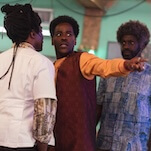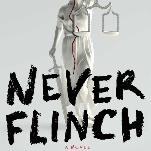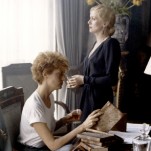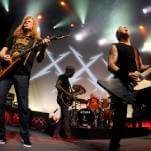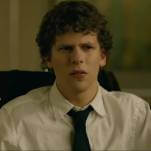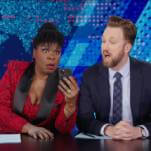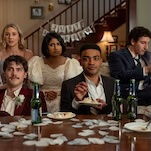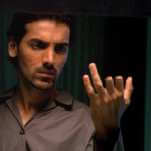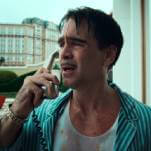Like many of my countrymen, I spent Super Bowl Sunday lying on my couch in my blue polar bear pajamas, chugging Nyquil and orange juice and watching direct-to-DVD romantic comedies while surrounded by used tissues and half-empty bottles of cat medicine. Incidentally, I plan to write about this experience in my forthcoming book: Nathan Rabin: Portraits Of Two-Fisted Heterosexuality. I would like to note that the half-empty bottles of cat medicine were for my sick cat, not myself. Like most folks I get my jollies huffing donkey blood-thinner.
The first two films I watched, Michael Ian Black's directorial debut Wedding Daze and the ill-fated Girls' Guide To Hunting And Fishing adaptation Suburban Girl were nothing special, despite the presence of mega-stars like Jason Biggs and Sarah Michelle Gellar. But the third film left an indelible impression on me. It was a shambling goddamned mess of a movie, overstuffed and over-reaching but vital and funny and alive. Also, it embodied an anachronistic, terminally out-of-fashion philosophy historians call "Feminism" in a manner at once casual and unapologetic. Watching writer-director Amy Heckerling's I Could Never Be Your Woman, I experienced the exhilarating thrill of discovery, the intoxicating sense of having stumbled onto something our culture cavalierly and undeservedly tossed aside.
I Could Never Be Your Woman is animated by a righteous sense of post-menopausal rage directed at a culture that infantilizes and sexualizes women at one end of the age spectrum and discards them as wrinkled old hags at the other. And that, dear reader, is why it went direct-to-DVD. That's why this sassy li'l lady needs a big strong, cat-owning man like myself to defend her movie for a special Valentine's Day edition of My Year Of Flops: The Bloody Aftermath.
With I Could Never Be Your Woman Heckerling more or less set out to make a movie about everything. She made a movie about May-December romances. She made a movie about mothers and daughters and coming of age and accepting the inevitability of adulthood and aging. She made a movie about celebrity culture and Los Angeles' warped values and television and the insane fetish for youth. She made a movie about mother nature and the toxic narcissism of baby boomers and an upside-down world world where successful men are encouraged to behave like adolescents well into their fifties.
With I Could Never Be Your Woman Heckerling has evolved or devolved into what I like to call a Newspaper Filmmaker, that is someone who reads the newspaper in the morning, gets angry and agitated by something in just about every section, then makes a film that expresses their indignation in the messiest manner possible.
There are times throughout when Heckerling doesn't even bother trying to dramatize her issues, when she instead lets Michelle Pfeiffer becomes a sentient Huffington Post editorial spewing rhetoric directly at the audience. It reminds me of the strident libertarian sermonizing of South Park. I think it would be refreshing if the subtitle "THIS IS HOW MATT STONE AND TREY PARKER FEEL ABOUT (X) CURRENT ISSUE AND/OR PROMINENT POP-CULTURE FIGURE" flashed across the screen whenever one of those foul-mouthed little mouthpieces delivers the episode's message. If you're going to be that heavy-handed about using characters to espouse your viewpoints you may as well be honest about it.
Heckerling has a strange bifurcated reputation as both an important, accomplished and distinctive filmmaker and a fucking hack. On the plus side she debuted with Fast Times At Ridgemont High, a brilliant piece of pop sociology that ranks as one of the greatest teen films of all time. She also produced Night at The Fucking Roxbury and directed Look Who's Motherfucking Talking A Second Goddamned Time, It's a Fucking Baby, How About That?.
Early in my career I had the supremely questionable privilege of interviewing Heckerling and Chris Kattan at a hotel room in Chicago during their press tour for A Night At The Roxbury. At an especially awkward point in the interview Heckerling asked me what I thought of the film. Now you never want to ask an interviewer point blank what they thought of your latest project. It's almost impossible to do so without coming off as both desperate and an insecure sad-sack fishing for compliments. This is doubly, no triply, no quadrupally true if the movie in question is Night At The Fucking Roxbury. I was supremely tempted to reply "What do I think? It's Night At The Fucking Roxbury. I did think Fast Times At Ridgemont High and Clueless were swell though!" Instead I tried, and failed, not to look mortified and said something diplomatic/untruthful about liking parts of the film (like the end credits! Hi yo!).
I similarly wanted to ask Heckerling, "You're a smart, talented woman. Why are you wasting your time with Night At The Fucking Roxbury?" Because I enjoy pimping out work I did as a 22-year-old here's a link to my career-making Night At The Roxbury interview. I like to think it's a lot funnier and more accidentally revealing than an interview promoting A Night At The Roxbury has any right to be.
Heckerling followed up her seminal work producing Night At The Fucking Roxbury with 2000's aptly titled Loser, a film that practically defines the phrase "dreary little nothing." Six years later Heckerling bounced back with a smart, funny, alive if ferociously flawed movie starring Michelle Pfeiffer and Paul Rudd. The universe rewarded Heckerling with a discreet direct-to-DVD burial. There was no way they were going to waste a theatrical distribution budget on some Post-Menopausal Wit' Attitude type feministical shiznit when the Larry The Cable Guy: Health Inspectors of the world desperately need to spread their message of hope to multiplexes throughout our fine land. Heckerling is simply too black and too strong for "The Man." And by "too black" I of course mean "too female" and "too strong" I mean "too old."
The always-awesome Michelle Pfeiffer stars as a veteran television writer/producer/show-runner behind You Go Girl, a You So Raven! like cotton-candy tweener confection nearing the end of a long, undistinguished run. While Pfeiffer stares down menopause and a pop culture infatuated with the new, fresh and novel, daughter Saoirse Ronan (a.k.a. the creepy little girl from Atonement) finds herself immersed in a scary new world of crushes and parties and schoolyard whispering and all the other strange components of the mating dance.
For you see I Could Never Be Your Woman is about nothing less than nature's cycles, as represented in human form by Tracy Ullman's Mother Nature, who acts as both the film's wisecracking Greek Chorus and Pfeiffer's sidekick. I have never particularly cared for Ullman. To me Ullman has exactly two modes: "big" and "ginormous." Consequently there's only one word silly and made-up enough to describe Ullman's performance here: bigormous. (In the film's audio commentary Heckerling says she was looking for a "1977 Bea Arthur" to play Mother Nature. I'm all like dude, who isn't looking for a 1977 Bea Arthur? I know I am.)
In a bid to pump new blood into her dying show Pfeiffer hires 29-year-old Paul Rudd to play the show's resident Poindexter. Pfeiffer then proceeds to fall hopelessly in love with Rudd herself. It's a testament to the exuberant, infectious silliness of Rudd's performance that every gesture, every quip, every wisecrack feels spontaneous and unrehearsed. Rudd has mastered the art of living in the moment onscreen, of giving audiences the impression that he's not acting at all but simply being his delightful, utterly charming, wildly amusing true self. Which begs the question: why isn't Paul Rudd a bigger star? Why are Jonah Hill and Seth Rogen, fine comic actors and gifted improvisers but nobody's idea of the perfect prom date, bankable leading men while Rudd seems trapped permanently in the affable buddy ghetto? I don't want to turn this piece into a gushing valentine to Paul Rudd but it's hard to overstate his role in transforming a tonally incoherent trifle into an utterly winning tonally incoherent trifle. Incidentally does anyone disagree with me? Is anyone bold enough to propose that Rudd is an eyesore, not remotely amusing and wholly devoid of charm?
Watching Heckerling's audio commentary for I Could Never Be Your Woman commentary I got the simultaneously refreshing and disconcerting feeling that I liked her film more than she does. On some level I appreciate Heckerling's wry, self-deprecating take on a project that must have broken her heart by not going anywhere. At the same time part of me resented her pissing all over my enjoyment of her film. To cite a telling example there's a very funny, loose little moment where Pfeiffer's conniving secretary tells Rudd that people think his acting's too broad and he responds with a bang-up spit take. Amusing, yes? Or not.
""It's better if you spit upwards but you really want to cross the frame with your liquids." Heckerling sourly insists during Rudd's big spit-take. The more I thought about it, the more I came around to Heckerling's point of view. A spit take really is funnier the more dramatic and pronounced it is. Thank you, Amy. You have convinced me that something I initially enjoyed wasn't that great and could have been much stronger. Now, would you also like to retroactively ruin my enjoyment of Fast Times At Ridgmont High and Clueless while you're at it? Maybe by pointing out ways they too could have been better?
Rudd's boyish, irascible charm wins over the audience and Pfeiffer but trouble looms in the form of Pfeiffer's back-stabbing secretary, a sitcom Iago who convinces Pfeiffer that Rudd is cheating on her with co-star Stacy Dash. There is a great deal of organic, unforced conflict and drama in the film's central relationship. As Ullman trenchantly points out, Rudd is still a relatively young man while Pfeiffer is rapidly aging out of baby-making range. And when Rudd's career begins to take off he's suddenly inundated with all the temptations of fame and money and mindless public adulation. So why do the filmmakers resort to a subplot as grindingly arbitrary and half-assed as the evil-secretary angle when there are plenty of legitimate challenges to Rudd and Pfeiffer's relationship?
Ringers Fred Willard and Jon Lovitz add invaluable support as Pfeiffer's boss and ex-husband respectively, silly old men still pretending to be hip twentysomethings, with all the slang and posturing and self-delusion that entails. In a city of eternal adolescence they feel no real pressure to act their age. Willard once again excels at blithe comic obliviousness: it may be an old joke but there's something unexpectedly wonderful about someone who looks and talks like Willard, that glorious slab of sentient white bread, using the word "crunk" without a hint of irony or self-consciousness.
When Willard tells Rudd that he'll never be a real man until he cuts the apron strings and asserts his independence from Pfeiffer he replies, with just the right note of semi-ironic defiance "I don't need to be a real man. I'm an actor!" This, dear reader, is a tee-shirt waiting to happen and a gleeful reminder of Heckerling's still-pungent gift for funny, punchy, clever dialogue.
The framing device of having Mother Over-Acting narrate the film doesn't really pay off until the climax, as Pfeiffer proudly watches her beloved daughter perform a painful political parody of "Ironic." (If nothing else Woman answers the eternally unasked question "What would 'Weird Al' Yankovic sound like if he were a 12-year old feminist played by the creepy little girl from Atonement?) It's then she comes to peace with her encroaching obsolescence. "Your body rots and your shows are stale," Ullman concedes sadly but also hopefully, before concluding that all that doesn't matter because Pfeiffer is simply making way for her daughter and the next generation of fiery, informed, angry and righteous little feminists in training. In this sublime moment an often clumsy and inconsistent film attains a rare state of grace.
Failure, Fiasco or Secret Success: Secret Success
















